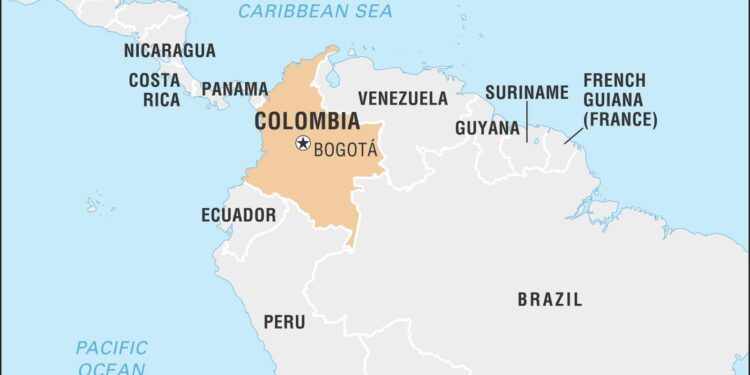In a heated response to ongoing criticisms from the United States, Colombian President Gustavo Petro has condemned allegations that his administration is not effectively combating drug trafficking. During a recent press conference, Petro defended his government’s strategies against narcotics, emphasizing Colombia’s commitment to reducing coca production and addressing the root causes of drug-related violence. This reaction comes amid heightened scrutiny from U.S. officials, who have expressed concerns over the rising levels of cocaine production and its impact on both nations. As the debate intensifies, Petro’s remarks highlight the complexities of international cooperation in the fight against drugs and the challenges faced by Colombia in navigating its historical struggles with narcotics.
Colombia’s President Petro Responds to US Drug Claims with Urgent Call for Collaborative Solutions
In response to the recent claims from the United States alleging that Bogotá has fallen short in its efforts to combat drug trafficking, President Gustavo Petro has taken a firm stance, highlighting the need for cooperative strategies rather than unilateral criticism. Petro emphasized the historical complexities of drug production in Colombia and criticized the U.S. for overlooking the socio-economic factors that contribute to the narcotics trade. He called for a mutual understanding and collaboration between nations, stating that it is essential to address the underlying issues that perpetuate drug production and trafficking.
Petro presented a four-pronged approach to enhance joint efforts in combatting drug-related issues, which includes:
- Comprehensive Development Plans: Implementing programs aimed at providing alternative livelihoods to communities engaged in coca cultivation.
- International Cooperation: Strengthening ties with neighboring countries to facilitate intelligence sharing and coordinated operations.
- Investment in Prevention: Focusing on preventive measures in drug abuse education and mental health support.
- Regulatory Revisions: Reassessing drug policies to prioritize harm reduction over punitive measures.
During a recent press conference, Petro unveiled a strategy aimed at fostering transparency and accountability in Colombia’s drug policy. This initiative seeks to engage international partners in a collaborative dialogue that addresses America’s demand while respecting Colombia’s sovereignty and shared goals of reducing drug violence. The president believes that only through unity and shared responsibility can effective solutions be reached in the ongoing fight against drug trafficking.
Examining the Impact of US Drug Policy on Colombia’s War on Narcotics
As Colombia continues to grapple with the realities of its long-standing conflict against narcotics, President Gustavo Petro has vocally criticized U.S. assertions that Colombia is failing in its drug-fighting endeavors. This rhetoric underscores a complex relationship shaped by decades of U.S. intervention strategies that have often prioritized military action over comprehensive reforms. Under Petro’s administration, there has been a push for a new approach that emphasizes social justice, alternative development, and harm reduction, challenging the metrics traditionally used by U.S. policymakers to evaluate Colombia’s progress.
The current U.S. strategy has historically focused on eradication of coca crops and militarization, often at the expense of sustainable development initiatives. This has led to a myriad of challenges including human rights violations, displacement of communities, and damage to the environment. The shift in Colombia’s stance towards a more holistic strategy necessitates a reevaluation of U.S. drug policy that encompasses:
- Alternative agricultural policies to support farmers transitioning away from coca cultivation.
- Investment in social programs that address the root causes of drug trafficking.
- Collaborative efforts that take into account the regional dynamics of drug production and consumption.
| Focus of U.S. Policy | Colombian Perspective |
|---|---|
| Eradication of coca | Needs to be coupled with support for farmers |
| Military aid and intervention | Should pivot to community development |
| Strict drug enforcement | Requires a focus on public health and harm reduction |
President Petro’s administration argues that the current measures not only hinder progress in stabilizing rural areas but also undermine Colombia’s sovereignty in crafting its own solutions to narcotics issues. Embracing a mutually beneficial strategy that intertwines Colombia’s aspirations for peace with the United States’ security interests may bring about a new era in the fight against narcotics, one that honors both national strategy and international partnership.
Recommendations for Strengthening Colombia’s Anti-Drug Strategies Through International Cooperation
In light of President Petro’s criticism of U.S. claims regarding Colombia’s anti-drug efforts, it is paramount for the Colombian government to enhance its approaches through robust international collaboration. Building strategic partnerships can amplify the effectiveness of anti-drug initiatives by leveraging various resources and shared intelligence. Key areas to focus on include:
- Increased intelligence sharing: Establishing mechanisms for real-time data exchange between Colombia and its international partners, particularly the U.S., can help in tracking trafficking routes and dismantling cartels.
- Capacity building: Engaging with international organizations to strengthen law enforcement and judicial institutions in Colombia ensures a more resilient framework in combating drug production and distribution.
- Economic development programs: Collaborating with foreign governments and NGOs to create sustainable alternative livelihoods can reduce dependence on coca cultivation in vulnerable communities.
Moreover, addressing the demand side of the drug equation through global outreach could further solidify Colombia’s position in combating narcotics. To facilitate this, a coordinated effort to:
- Promote drug decriminalization discussions: Influence international symposiums to foster dialogue on alternative approaches to drug use and its regulation.
- Enhance public health initiatives: Collaborate with international health organizations to promote harm reduction tactics, thus improving treatment options for substance abuse.
Implementing these recommendations not only fortifies Colombia’s anti-drug strategies but also paves the way for a more unified global response to drug-related issues.
The Conclusion
In conclusion, President Gustavo Petro’s vigorous defense against the United States’ accusations of Colombia’s inadequacy in combating drug trafficking underscores the complexities of international relationships and the multifaceted nature of the drug trade. As Colombia seeks to navigate its own policies and challenges, the dialogue with the U.S. will be crucial in shaping future strategies aimed at addressing not only narcotics but also the socio-economic factors contributing to the crisis. As both nations grapple with the implications of these criticisms, the path forward will require cooperation, understanding, and a shared commitment to effective solutions. The outcome of this diplomatic discourse may have significant repercussions for Colombia and its allies in the ongoing fight against drugs and organized crime.












